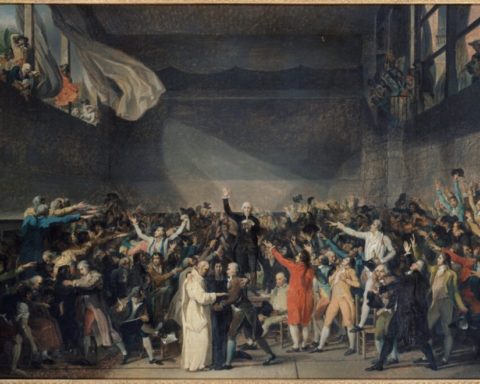Digital technology is not only an effective tool for a wider audience; it is changing our relationship with others, our relationship to the world, our individual and collective memory... By multiplying the possibilities of surveillance of individuals, it is reshaping the space of privacy.
What will happen to these barely begun mutations? How can we define the contours of digital thinking, which is seen as genuine progress for mankind and not as an alteration of its humanity?
Many of the current debates show, in the very definition of the Internet user, a tension between a creative, strolling Internet user, freed from constraints, and a prisoner, subjugated, domesticated Internet user. It is rather between the two that we should be able to better describe the novelty of uses, as shown by two questions that are very present at the heart of the notion of trust: that of privacy, algorithms, etc. Here is Maryvonne Valorso-Grandin's summary of the seminar held on March 11, 2015 at the Collège des Bernardins by Edouard Geffray and Dominique Cardon.
Edouard Geffray, Secretary General of the CNIL, addresses the theme of trust through personal data and the situations of mistrust and anxiety that are often linked to it. Indeed, compared to the order of freedoms, personal data occupies a special place in the digital environment. The greatest change lies in the unprecedented meshing of the private or public lives of individuals, initiated by personal data, which makes it possible to establish a continuum between the different compartments of digital life.
The connected objects return information, which is likely to be cross-referenced and generate increasingly fine profiling. Whether it is personal data knowingly delivered or traces left behind that can be linked to the given information, in both cases we are witnessing a paradigm shift to create predictive profiling. This shift towards an economy of data and traces means that the potential for constraining choices as well as enriching the service is strong, creating an ambivalent relationship to be accepted and assumed in trust. Never before in history have actors, particularly private ones, had the ability to know individuals with such precision and regularity on so many different objects, whether it be geo-location, centres of interest, e-mail correspondence, etc.
The other notorious change for Edouard Geffray is that data is an informational capital that becomes a financial asset for the company. From an entrepreneurial point of view, the protection of personnel is more and more a question of trust and therefore of competitiveness. Until the digital revolution, the processing of personal data was a relatively stable basis and framed by a system of declaration and authorization provided for by the French Data Protection Act (Loi Informatique et Libertés). In a world characterized by technologies, uses and the growing sensitivity of individuals to the use of their data, it is necessary to ensure that the bond of trust is not broken, so as not to risk image or commercial damage which would have a very significant multiplier effect on a digital scale. Today, personal data, because of the network and the continuum between the different compartments of life, has a double leverage effect on individuals and companies that are clients of other companies, which is shaking up the landscape. Personal data is worth nothing as such, except that it reveals a part of the individual's intimacy, which it exposes to profiling on which players will then capitalize.

In this environment, how then can trust be established? According to Edouard Geffray, an adapted legal framework is necessary but not sufficient: the individual must be given the possibility to control his data and effectively exercise his rights. Control is the foundation of trust, because if you do not control your data, you will only reluctantly entrust them to third parties, even if they are an administrative authority. If, on the business side, this financial asset is an economic issue that justifies a paradigm shift, on the public authorities' side, the problem of trust is posed in the same terms, but with greater acuity due to the concentration of information and the use that is made of it. In order to avoid the arbitrary action of a State that would break the contract of trust by collecting information on citizens, the French legislature has strengthened the right of access of citizens to any file concerning them provided for by the Data Protection Act, by means of an indirect right of access allowing the CNIL to go and see, on behalf of citizens who so request, what is in these files in order to check that there is no illegitimate, illegal or excessive filing. The increase in requests for indirect access rights recorded after the Prism scandal in 2013 is evidence of the public's growing sensitivity to these issues of surveillance and trust.
For the CNIL, you can't in a rule of law, unless the overall balance of the social contract is upset, massive capture and undifferentiated data without rigorous safeguards. Hence the need in a The aim is to create an appropriate regulatory system that is technologically, legally and in terms of uses.
The approach proposed by Edouard Geffray follows three directions, the first of which is the reinforcement of the rights of the individual so that he retains control over the destiny of his data. By the end of 2015, a European regulation will replace the 1978 law on Information Technology and Freedom in order to strengthen the rights of individuals upstream (the
The data protection legislation in force in the country of origin (e.g. the person is supposed to consent to the processing of his or her data, except in cases provided for in the texts) and downstream (the person is supposed to be able to retrieve his or her data, to better control the provision of the data, or even to have it deleted). Since April 2014, the Court of Justice of the European Union has enshrined the right to dereferencing on search engines, ruling that any person may ask a search engine, if he has a legitimate reason for doing so or if the information concerning him is erroneous, to delete from the list of searches a result associated with his name.

The second direction is the assertion of a certain digital and legal sovereignty. In European law, the protection of personnel is, even beyond the protection of privacy, a fundamental right recognised by the Charter of Fundamental Rights of the European Union. However, this right, which has an intrinsic structuring value in the European humanist model, centred on the individual, must be effectively guaranteed to all citizens and must be able to monitor their data in order to constitute a genuine ethical and legal framework of trust. The difficulty is that, in order to be able to provide protection that is not universal but is attached to the person and is imposed on a territory, we come up against questions of sovereignty and territoriality, which presuppose a framework of territorial regulation. According to Edouard Geffray, the de-territorialized or a-territorialized phenomenon nowadays comes up against two temperamental elements: the first is the fact that certain legislation in non-European countries is intended to have an impact on the personal data of European citizens (cf. American legislation such as the Patriot Act and Foreign
Intelligence Surveillance Act allowing US public authorities to collect data on European residents from US operators); the second is that data of European citizens may, for legitimate commercial reasons, be transferred to countries outside the European Union.
How then, if it is a fundamental right in Europe, how can we guarantee the protection of personal data that "spins" out of European territory? The European regulation currently under discussion provides, in convergence with the proposals of the CNIL, that any transfer of data to foreign public authorities at their request, even on the basis of a well-established law, must be preceded, when it concerns European residents, by the agreement of the European public authorities, otherwise the company is deemed to violate the European regulation and therefore liable to sanctions. The idea is to create a conflict of laws that only an international agreement, between Europe and the United States, for example, will be able to resolve in order to reintroduce, in particular, the principles of proportionality or legitimate interests and guarantee to the citizen that his data will not be sucked out of the control of the European authorities responsible for his protection. With regard to transfers of private initiative, legal instruments already exist to create a legal bubble to ensure that data circulating in the world retains the same level of protection as in the European Union.
Edouard Geffray adds that at the CNIL, the system of "Rules Binding Corporate Rules (BCR), allows a group to make a binding corporate rule for a group to circulate the information to all its subsidiaries with the commitment, each time a European data will be processed, to respect the European standard everywhere in the world. This extra-territorial effect, which has the unique scope to ensure the same level of protection for the data of European residents is an element of trust.
Finally, the third direction is the construction with all stakeholders of an ethical regulatory framework guaranteeing the harmonious development of the digital economy and innovation. In December 2014, the European Technical Group (G29 bringing together the European CNILs) held a conference at UNESCO, The European Data Governance Forum, set out in a joint declaration a set of principles to crystallise what the European model is based on. These principles aim to ensure that European citizens who entrust the keys to their private life to companies or administrations can do so knowing that there is: upstream, a protective legal framework, whose guidelines are accessible to all, which ensures that they can have access to new services without their rights being disregarded; and downstream, controls by the CNIL or the judge in the context of the right of opposition and dereferencing.
To ensure better IT security, the CNIL is constantly expanding its offer in terms of expertise and support: in a number of sectors, it has developed labels attesting that the company you have to deal with, or the service to which you subscribe, is labelled "informatique et libertés", i.e. complies with a high standard in terms of staff protection. There remains the question of data cross-referencing and whether or not, in the presence of a single service, one accepts or not that all personal data be cross-referenced between different dimensions, or whether one has the right to control, if not the fate of the data between them, at least their cross-referencing.
For example, is one allowed to object to correspondence in Gmail are matched up with searches in the search engine? For its part, the CNIL defends at the level of directives the idea that one cannot universally cross-reference data across all services, without any inform people in advance and without giving them the means to oppose some of these crossings.
Placing oneself in a relational field where part of the trust is more in the order of risk-taking than risk reduction, Dominique Cardon, sociologist at the SENSE department of Orange labs, broadens the field of investigation of the notion of trust to social networks and online relationships by making it a field in its own right of social sciences. According to him, the theme of trust is always a little intriguing for a sociologist, because behind the institution, the regulation, the legal norm, there is the social norm that are the morals, the normative base of ordinary actions that makes us take or not take risks, that we have or have not taken, that we have or have not taken, that we have or have not taken, that we have or have not taken, that we have or have not taken, that we have or have not taken, that we have or have not taken, that we have or have not taken, that we have or have not taken, that we have or have not taken, that we have or have not taken, that we have or have not taken, that we have or have not taken, that we have or have not taken, that we have or have not taken, that we have or have not taken, that we have or have not taken, that we have or have not taken, that we have or have not taken, that we have or have not taken, that we have or have not taken, that we have or have not not favourable representations of digital activities.
How do you explain that the Internet that was "nice" in the years 2000/2005, is no longer the case today? Dominique Cardon chooses to rely on climate change and representation in opinion as witnesses to the transformation of representations and attitudes towards of the Internet, including the researchers themselves. The Internet would have lost the character of wild, attractive creativity, the development of trade empires, the turnaround of the Soviet Union and the States in the regulation of networks, the massification of uses that have profoundly changed it. This change in For Dominique Cardon, the climate is also very striking: if in the 2000s, the dominant paradigm was that of the creative force of the network, of the imaginations, of the power of action of individuals, of this capacity to emancipate, to make the world, to be exiled on the Internet from the real society (cf. Gilles Deleuze, Félix Guatarri), today the paradigm is that of rationalisation, domestication, alienation, economisation (cf. the Frankfurt School, Theodor Adorno, Max Horkheimer).
All the transformations, deformations, alterations of which the Internet is today the vector, however, invite us to take a vigilant, even critical look at this new criticism of the Internet. The Internet was "nice" for intellectuals when the Internet market was limited. From the moment everyone started talking about co-design, sharing, open, crowdfunding companies, when the discourse became a corporate discourse, academics and researchers forgot what they had said before and left it to companies to use the same vocabulary and to switch to a stronger criticism. The Internet discourse is dominated by a practice-saving discourse, which is on the side of the GAFAs (Google, Apple, Facebook, Amazon) and no longer describes the Internet user's experience as an exciting, passionate, socially connected, politically participative practice, but increasingly as an economic practice.
Dominique Cardon gives three different keys to reading how the transformations of digital technology, in particular the Internet, have modified the intellectual representations of the Internet: those of the significant massification of uses, of Digital Labor as a symptom of the current discourse and of alienation as an adjacent component of the discourse on the exploitation of Internet users.
For Dominique Cardon, it is striking to note that the Internet that serves to criticize current practices is that of the pioneers who sociologically were a male, hyper-educated, American population, that of an Internet that has built a representation of the practice of the Internet user on the model of creativity, that of an individual by excess as Robert Castel calls it, individualized, detached from all constraints, who forges his points of view, is a real loafer, knows how to navigate because of his sharp curiosity, is constantly open to others. It is by considerably developing the practice of exchange and self-production that the model invented by the pioneers has become a popular, ordinary practice that has massified uses and contributed to the success of the Internet.
This democratization was not based on the asymmetrical producer/receiver model but on the fact that the receivers produce too. Today, many of those who deplore the new Internet are manifesting a kind of unconscious social contempt for new users who use participatory tools, always with the idea of express themselves, interact and participate, but simply because of the social properties of these new audiences, this is called the chatter, the LOL, the flashing. The loafers, overindulged individuals, think that new audiences are only not really individualized but are, to use Robert Castel's terminology, individuals by default.
The Digital Labor has become a central element in many intellectual debates, meaning that the Internet user, through his click or each of his actions, is constantly being described as working for the GAFA's who produce value by using personal data to resell them to advertisers. This comes from an economization, a way of describing the activities of Internet users as being an activity underpinned by intrinsic (example: writing a blog means that my objective is within my present experience) and extrinsic (example: I do not act because I am enjoying myself but because I have an external motivation, such as making money) motivations.

The economists had found a sophisticated argument (cf. Jean Tirole, Nobel Prize winner in economics) which was to say that intrinsic motivation allows you to send signals to the community that you have a reputation, which you can then sell on the labour market to be recruited by a good company. So there would be a kind of internal reputation export system linked to the intrinsic motivation to the extrinsic motivation. What has been at the heart of the Internet and of the early accounts of sociologists, philosophers, anthropologists, is a model linked to that of gift and to the idea that if one enters the digital world, it is because one acquires a kind of motivation that is both intrinsic and extrinsic, which is prestige, reputation, recognition. The value of the community lies in the fact that it takes signals from the community that attribute qualities that can restore and build self-esteem in the eyes of the community.
But for Dominique Cardon, these transformations and representations of the Internet are putting the global economy of the Web in crisis on at least three points: First of all, the transformation of positive externalities with the massification of the Internet, because today it is no longer the pioneers who produce a positive externality but the popular circles of Facebook, its pages, social networks and if advertisers and merchant sites go on the Internet it is not because there are expert bloggers who produce interesting content (formerly from Pôle de Recherche 4 the positive externality that the market could capture) but for the millions and millions of Facebook pages, the conversations of new audiences; then, the increasingly explicit presence of a calculating ethos in the behaviour of a fraction of Internet users to gain prestige, community recognition, those who are most visible, the most prominent, who seek to obtain better numbers of Followers, Retweets, to build their reputation; finally, the weakening of the pioneers' model around the tools of collective intelligence that
have constructed the positive representation of the Internet, following the idea that, in the community, individual actions were transformed by mechanisms of collective intelligence that were not the sum of the actions of each individual. In the mechanisms of collective intelligence, there is a phenomenon of transformation, of displacement of each individual action to make it a collective product that is more than the sum of its parts. Among these very diverse tools of collective intelligence, there are algorithms such as the Patch Ran, which is an instrument for transforming individual actions into something collective that is a service to all: we need the knowledge of each and every site to produce an overall collective result. Neither users nor intellectuals think of collective intelligence tools as precisely collective intelligence tools anymore (cf. Yochai Benkler, "The richness of networks").
Today, collective intelligence has been appropriated by the GAFA to make profit and a algorithm is no longer used to produce the common but to generate revenues for the major platform operators.
If Digital Labor's discourse consists in saying that Internet users should be remunerated because they work for the platforms, the debate is complicated, according to Dominique Cardon, because of the number of possible remuneration solutions, some of which are interesting when they are collective, or in the order of a global redistribution, but more.
of concern when they set up a split between those who would receive money to give back because they do not produce creative content and those who would be paid for their creative content. The question of representations on the Internet is weakened today by a whole series of discussions aimed at saying that if mass Internet users have cooperative practices that are not really cooperative compared to those of the pioneers, if they are calculating agents on the Web who work unknowingly for the GAFA, then there must be a theory of alienation, i.e. we must explain why people make such a distressing mistake about the real meaning of their activities: they think they're participating in a "knitting" community, but they're actually working for Google.
For Dominique Cardon, this is the subject of a complex debate, notably on the fact that one of the driving forces behind critical discourse on the Internet is aimed at reanimating Foucauldian motifs on the subject, which is inhabited and traversed by the new forms of cognitive capitalism, according to which people finally make money out of their feelings, thoughts and desires, and that, beyond the usual components of the capitalist exploitation of labour, it is ultimately the very subjectivity of the Internet user that is grasped by these new forms of capitalism. Many of the current debates point out, in the very definition of the Internet user, a tension between a creative, strolling Internet user, freed from constraints, and a prisoner, subjugated, domesticated Internet user.
Rather, it is between the two that we should be able to better describe the novelty of the uses, as shown by two questions that are very present at the heart of the notion of trust: that of privacy, where, although the negative vision of the digital world [state surveillance, interpersonal surveillance and surveillance by large corporations] is very present in the consciousness of individuals, they continue to expose themselves and deliver data, even if their practices increasingly give them (somewhat falsely) a sense of control and mastery; and that of algorithms, in respect of which users can be very critical of the idea of being dominated by machines or having their choices prescribed, even if, in their use, the fear of over-prescription does not prevent them from being in a strong enough coupling with these machines since they provide them with services.
For Dominique Cardon, the current discourse of economization would thus come from a very individualizing reading of behaviors that ignores the connected, assembled, composite individual, this individual-community that was at the heart of the description of its social practices. The human aspires to be an individual, fully autonomous individual, and if an algorithm prescribes something to him, he feels alienated and constrained. And it is this definition of the individual that makes us forget the more assembled, collective, connected dimension of the individual who is constantly composing and articulating his actions and desires in an environment of technical artifacts.
Research centre Collège des Bernardins - 2015












